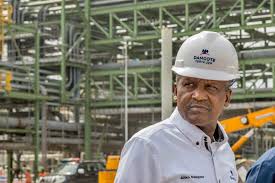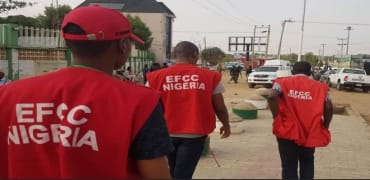Dangote Sells Petrol At ₦990/Litre: What IPMAN's New Deal Means For Nigeria's Fuel Prices
“Dangote Sells Petrol at N990/Litre: What IPMAN's New Deal Means for Nigeria's Fuel Prices”
By Achimi Muktar
In a groundbreaking deal that could reshape Nigeria’s fuel market, the Independent Petroleum Marketers Association of Nigeria (IPMAN) has reached an agreement with the Dangote Petroleum Refinery to purchase petrol at rates that could bring much-needed relief to Nigerians. With over 30,000 IPMAN members set to buy Premium Motor Spirit (PMS) directly from the refinery, the price per litre is pegged at N940 for bulk purchases via ships and N990 for truck-loaded deliveries.
The historic agreement comes just months after the Nigerian National Petroleum Corporation (NNPC) suspended its initial plan to act as the sole off-taker for the 650,000-barrel-per-day Dangote refinery in Lekki, Lagos. IPMAN’s direct access to the refinery, bypassing third-party intermediaries, promises to bring down petrol prices at retail stations in the coming weeks, according to IPMAN President Abubakar Garima.
A New Chapter for Nigeria’s Fuel Market
Speaking during a televised interview, Garima revealed that IPMAN had successfully negotiated for two pricing tiers: N940 per litre for those who transport fuel via ships to depots, and N990 per litre for those using trucks. This could spell an imminent reduction in the retail price of petrol by as much as N50 per litre, depending on the buyer's location and logistics costs.
“The difference in price reflects the transportation methods,” Garima explained. “For places like Port Harcourt, Warri, and Calabar, where Dangote doesn't have direct gantry access, we’ll need to use vessels. This means slightly lower prices compared to truck deliveries.”
Checks by our correspondents confirm that this new pricing is marginally lower than last week’s rates, which ranged between N960 and N990 per litre. With hopes of further price reductions, Garima emphasized that Nigerians would soon see a tangible decrease in fuel costs at filling stations across the country.
Goodbye to Imports?
Perhaps one of the most significant implications of this deal is the possibility that independent marketers may no longer need to import petrol. For decades, IPMAN has relied on imports to meet Nigeria’s massive fuel demand. However, with Dangote’s refinery now online and producing at scale, Garima believes there’s no need to look beyond Nigerian shores for fuel supplies.
“When you can get it locally at a reasonable price, why import?” Garima asked rhetorically. “We’ve been clear from the start that we support Dangote. Now that we have this partnership, the cost savings will trickle down to the masses.”
Hammed Fashola, IPMAN’s Vice President, echoed this sentiment, explaining that while logistics still need to be sorted out, the days of importing petrol could be behind them. “It’s a win-win situation for everyone. We’re simply waiting for the final steps, like payment modalities, before we start lifting fuel from Dangote,” Fashola said.
Fuel Scarcity? Not Anymore
In addition to price reductions, Garima highlighted another key benefit of the agreement: a reduction in fuel scarcity. “Previously, the delay between paying for fuel and receiving it at depots caused shortages,” he said. “Now, with direct access to Dangote’s refinery, those delays will be eliminated.”
Chinedu Ukadike, IPMAN’s National Publicity Secretary, confirmed that documentation is already being finalized, allowing the association’s members to start lifting products in bulk from the refinery. With this direct supply chain, fuel shortages that have plagued the nation in recent years could finally be a thing of the past.
What’s Next?
As the deal takes shape, many eyes are on how this will impact the broader Nigerian economy. With petrol prices likely to fall as intermediaries are cut out and supply chain bottlenecks are addressed, Nigerians could soon experience relief at the pumps. Furthermore, the agreement signals a shift away from Nigeria’s heavy reliance on imported fuel, which has long been a source of volatility in domestic markets.
While the exact timeline for price reductions remains uncertain, Garima assured the public that the impact would be felt “in the coming weeks.” In some regions, like Maiduguri, where petrol currently sells for N1,200 per litre, prices could drop to N1,150 or even lower, depending on future developments in the global oil market and the value of the naira.
“We’re in a deregulated market now,” Garima concluded. “As supply increases and the naira stabilizes, we can expect prices to continue falling.”
A Global Player
Meanwhile, Dangote’s refinery is also looking beyond Nigeria’s borders. According to reports from S&P Global Commodity Insights, the refinery has signed its first export orders for gasoline, with over 200,000 metric tonnes set for international markets. While the refinery initially issued a tender to sell 40,000 metric tonnes of gasoline abroad, public outcry forced them to revoke the offer. Now, however, with domestic production ramping up, exports are back on the agenda.
The Future of Nigeria’s Fuel Market
As IPMAN and Dangote solidify their partnership, it seems clear that Nigeria’s fuel market is on the brink of significant change. If this new deal delivers on its promise, Nigerians could see a future where petrol is not only more affordable but also more readily available—a crucial development for a country that has long struggled with fuel scarcity and fluctuating prices.
For now, the nation waits with bated breath to see just how far-reaching the effects of this historic deal will be. Will the partnership between IPMAN and Dangote bring about the change Nigerians have long hoped for? Only time will tell.






















